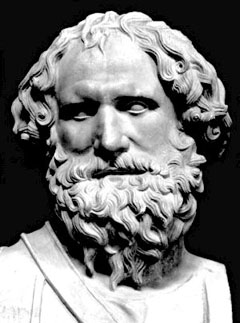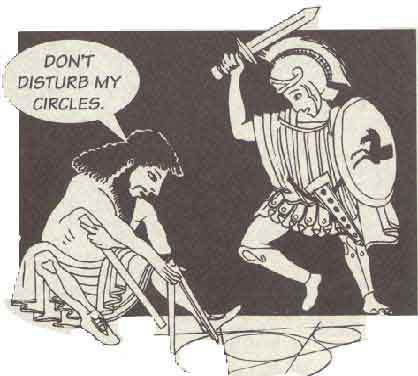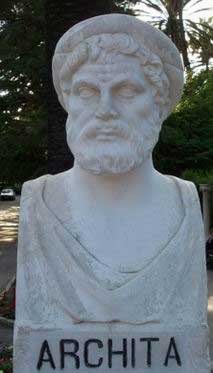Thales of Miletus
Little is known of Thales. He was born about 624 BC in Miletus, Asia Minor (now Turkey) and died about 546 BC in Miletos, Turkey
Thales of Miletus
Some impression and highlights of his life and work follow:
Thales of Miletus was the first known Greek philosopher, scientist and mathematician. Some consider him to be the teacher of of Pythagoras, though it may be only that he advised Pythagoras to travel to Egypt and Chaldea.
From Eudemus of Rhodes (fl ca. 320 B.C) we know that he studied in Egypt and brought these teachings to Greece. He is unanimously ascribed the introduction of mathematical and astronomical sciences into Greece.
He is unanimously regarded as having been unusally clever--by general agreement the first of the Seven Wise Men, a pupil of the Egyptians and the Chaldeans.
None of his writing survives; this makes it is difficult to determine his philosophy and to be certain about his mathematical discoveries.
There is, of course, the story of his successful speculation in oil presses -- as testament to his practical business acumen.
It is reported that he predicted an eclipse of the Sun on May 28, 585 BC, startling all of Ionia.
He is credited with five theorems of elementary geometry.
From W. K. C. Guthrie we have
The achievement of Thales, has been represented by historians in two entirely different lights: on the one hand, as a marvelous anticipation of modern scientific thinking, and on the other as nothing but a transparent rationalization of a myth.
According to Guthrie himself, one may say that ``ideas of Thales and other Milesians created a bridge between the two worlds-the world of myth and the world of the mind."
Thales believed that the Earth is a flat disk that floats on an endless expanse of water and all things come to be from water.
But, more preciesly, Thales and the Milesians proceeded from the assumption of a fundamental unity of all material things that is to be found behind their apparent diversity. This is the first recorded monism in history. He also regards the world as alive and thus life and matter to be inseparable. Even plants he feels have a immortal ``soul".
Being asked what was very difficult, he answered, in a famous apophthegm, "To Know Thyself." Asked what was very easy, he answered, "To give advice." To the question, what/who is God?, he answered, "That which has no beginning or no end." (The infinite!!)
So the task of the philosophers was to establish what exactly provided this unity: one said it was water; another, the Boundless; yet another, air.
Thales is believed to have been the teacher of Anaximander and he is the first natural philosopher in the Ionian (Milesian) School.
Thales is also said to have discovered a method of measuring the distance to a ship at sea.

Five basic propositions with proofs of plane geometry are attributed to Thales.
Proposition. A circle is bisected by any diameter.
Proposition. The base angles of an isosceles triangle are equal.
Proposition. The angles between two intersecting straight lines are equal.
Proposition. Two triangles are congruent if they have two angles and the included side equal.
Proposition. An angle in a semicircle is a right angle.
Thales the Mathematician
Proposition. An angle in a semicircle is a right angle.
Proof.

Since there was no clear theory of angles at that time this is no doubt not the proof furnished by Thales.













